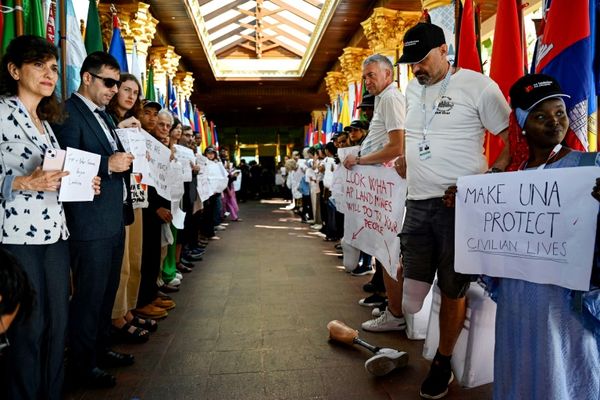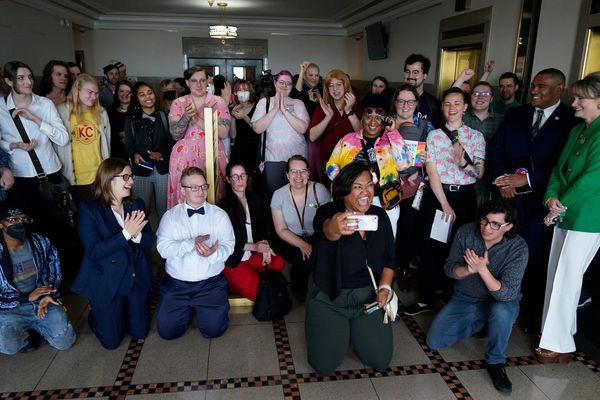WASHINGTON _ Most Democrats haven't settled on a favorite candidate in their historically large presidential primary field _ and the party's biggest donors are no exception.
At least 7,500 donors have contributed to two or more Democratic contenders in 2019, according to a McClatchy analysis of campaign finance records.
It's an unusually high number. By comparison, a little more than 1,000 donors had given to multiple Republican White House hopefuls at the same point in the 2016 election cycle, which featured a similarly crowded field.
Hollywood mogul Jeffrey Katzenberg has supported the most Democrats of any donor so far in the 2020 campaign, cutting checks of $2,800 _ the maximum amount allowed for a primary _ to 14 candidates.
Six months out from the start of voting, Katzenberg and other major donors are in no rush to line up behind just one candidate in a race that does not feature a clear front-runner. Instead, they are looking to help several candidates qualify for the debates and stay afloat _ for now, at least.
"Jeffrey Katzenberg has long-term friendships with many of the candidates running for the Democratic nomination and has tried to be supportive of all at this stage of the process," Katzenberg spokesperson Andy Spahn said in a statement. (Spahn himself has given to six candidates so far this cycle.)
In a typical presidential contest, candidates try to lock down the support of big donors early in the process. But in a field with more than 20 contenders, donors aren't fielding those same requests at this point.
"We are not getting pressure to make that exclusive choice, in the same way that campaigns have done in the past," said Rufus Gifford, who oversaw fundraising for Barack Obama's 2012 reelection campaign. Gifford has donated to five 2020 candidates thus far.
South Bend, Ind., Mayor Pete Buttigieg is the only Democratic candidate who has publicly released the names of his bundlers, who help collect contributions from other donors. Notably, half of the bundlers on one recent list from his campaign have also given to other presidential contenders this cycle, including multiple members of the Pohlad family in Minnesota, which owns the Minnesota Twins, and Esprit co-founder Susie Tompkins Buell.
New Democratic National Committee rules have helped encourage this level of political promiscuity. One way for candidates to qualify for the first two debates in June and July was to have at least 65,000 donors. DNC chairman Tom Perez has even encouraged Democrats to "fall in love" with multiple candidates in the early going of the race.
"These are good people running," said Cynthia Friedman, a Palm Beach-based co-founder of the DNC's Women's Leadership Forum, who has contributed nearly $12,000 in total to five candidates. "From the beginning, I wanted to make sure that they were on the debate stage."
So far, Buttigieg and Sen. Kamala Harris have shared the most donors in common, with more than 1,000 contributors giving to both candidates this year. Harris and Sen. Elizabeth Warren have just under 1,000 donors in common, and shared the most overlap in the last fundraising quarter.
Warren has also shared nearly 800 donors in common with Sen. Bernie Sanders and about 750 donors with Buttigieg. Harris and Joe Biden, meanwhile, have had around 550 of the same donors.
(McClatchy's analysis only includes the donors reported by campaigns, which are not required to identify individuals who give less than $200 in total.)
Donors said they are eager to see how the early debates play out before narrowing down their options. The second debate will take place over two nights in Detroit next week.
"At these early stages, I like to see that the better (in my opinion) candidates each get some support," Ronald Rivest, a professor at the Massachusetts Institute of Technology who has contributed $4,500 total to seven candidates, wrote in an email. "Once the field is narrowed, my support will narrow."
But the pressure on candidates to prove to donors that they can remain viable is already increasing. From the beginning of April through the end of June, 10 major candidates spent more money than they raised.
And in order to qualify for the September debate, candidates need to reach at least the 2% mark in four polls in addition to receiving contributions from more than 130,000 unique donors, a threshold the majority of the field has yet to hit.
"He or she needs to explain to me how they get to the September debate stage," said Robert Wolf, the former UBS Americas CEO and economic adviser to Obama, who has so far given just over $11,000 combined to eight candidates. "I do not want my money to go buy donors, so you can hit 130,000. I want to give money so you can build a campaign to beat (Donald) Trump."
Still, many donors do not have a set timeline for making up their minds.
"I think I'm going to sit out as long as I can before settling on one candidate," said Sara Fenske Bahat, a San Francisco-based economics lecturer at California College of the Arts, who has given more than $8,000 combined to seven candidates.
And then there are other donors who are open to supporting even more candidates down the road.
"I find many fine and competent individuals in the group of candidates who are running, more than the seven I've supported, and I'd rather stay open-minded," Nora Jaffe, of La Jolla, Calif., wrote in an email. "I don't rule out voting in the primary for someone I have yet to support."






